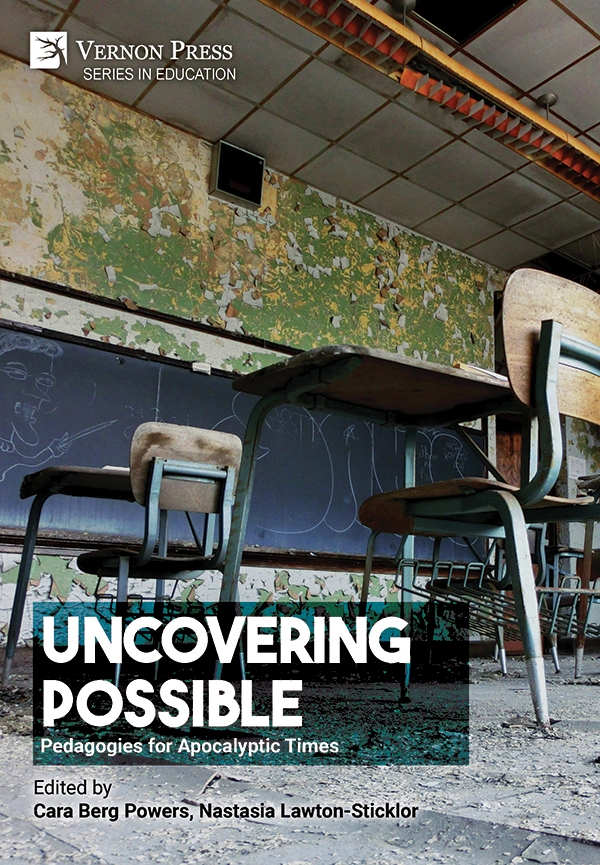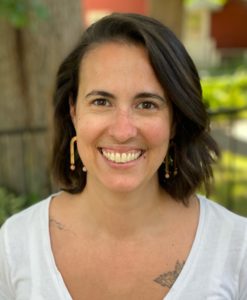why apocalyptic pedagogy?
Dr. Lawton-Sticklor and Dr. Berg Powers have both straddled the worlds of youth education and higher ed, and are particularly interested in amplifying youth and practitioner voices, community-based research, and the role of youth in social change. Cascading crises face our children and classrooms, each day throwing newly hellish challenges at those committed to supporting children and youth in developing as whole healthy humans. While apocalypse jokes may be rampant on social media, with plagues and wild fires and fascist violence providing ample fodder, the Greek root word, αποκαλυπτω, means “to reveal, or uncover.” What does it mean to have the courage to look at what is being uncovered and commit to meeting it head on?
As mothers of young children during the pandemic also working with teens and K-12 classroom teachers, we’ve both had a unique vantage point through which to observe the dimensions of impact across populations. Both of us taught pre-service teachers from home while managing remote schooling for their own children and have observed some of the unique ways that mothering and teaching have exposed gendered expectations of caring during these challenging years. We know these expectations are compounded for educators of color, disabled educators, LGBTQIA educators, and others who have had to filter through disparate impacts of the pandemic, racial injustice, attacks on LGBTQIA rights, reproductive autonomy, and climate catastrophe, all while showing up to do our best in supporting kids experiencing the same. For young people, we recognize the ways in which their coming of age is marred by an uncertainty far beyond that even of us as Millennials.

We also know that the very educational tools that we need in this moment- critical pedagogy, culturally and linguistically sustaining practices, transformative justice, and social emotional education- are all under attack. We know that defending those tools is necessary and insufficient. The precipice we stand on demands visionary leadership, and we know that leadership will not come from those who cannot even see the crisis for what it is. As Massachusetts Congresswoman Ayanna Pressley often says, “the people closest to the pain should be closest the power.” It will take all of us to make that true, and what we can offer is lifting up the solutions of the educators, students, and parents closest to the pain to help paint a vision of what is possible to not just survive these apocalyptic times, but transform to thrive.
Nastasia Lawton-Sticklor
phd
Nastasia Lawton-Sticklor is an educator, climate justice activist, nonviolent direct action practitioner and trainer, photographer, and parent to two youngsters, aged 6 and 9. Nastasia spends her time organizing with the No Coal No Gas campaign in New England, supporting youth-centered organizations through board membership and volunteering, and local political advocacy. She is a national convener for the Council for an Uncertain Human Future.
Nastasia is a fellow at the Climate Disobedience Center with a research interest in restorative transitions from fossil fuels and a transformative justice approach to climate activism. She approaches this work with the belief that climate justice can only be reached through decolonizing and dismantling White supremacy and capitalism and that our resistance to these systems lies in our solidarity and interconnectedness.
Nastasia’s previous work at the Hiatt Center for Urban Education at Clark University involved cultivating spaces that uplift youth voices through qualitative research using storytelling, multimedia arts, and photography to explore social injustices and create pathways for change. Her teaching practice both in classroom and community spaces focuses on interrogating traditional pedagogies and exploring ways to build antiracist and liberatory teaching practices that are grounded in multigenerational collaboration and relationship building. She has co-authored multiple articles with educators and youth exploring and advocating for learning spaces that prioritize social justice and multigenerational knowledge. Nastasia holds a Masters’ in Teaching from Clark University and a Doctorate in Educational Leadership from Simmons University. She is currently pursuing a Master’s degree in Restorative Justice at Vermont Law School.

Cara Berg Powers
edd

Cara is an innovative strategic thinker working across a variety of disciplines to build the capacity of communities to create meaningful and lasting change. Cara has been working for over 15 years in arts, education and culture to help people reimagine and reshape the world. She is currently the Massachusetts State Director for Brown’s Promise as well as a Visiting Professor at Worcester State University. She was most recently on the visiting faculty in the Community, Youth, and Education Studies program at her alma mater Clark University, where she shared her varied experience in youth and community work, including over a decade as Executive Director of the Transformative Culture Project (TCP). She has previously taught at UMASS Boston and Wheelock College, as well as guest lecturing at a number of colleges and universities. She has produced content for MTV and NBC, and has presented at national conferences on issues of media, culture and equity. She has also provided training and planning support for organizations Facing History and Ourselves, Project LEARN, OxFam America, and the Harvard Kennedy School.
Before her time at TCP, Cara founded the Youth Media Institute at Project: Think Different and also ran Digital Media programming for the United Teen Equality Center (UTEC). She holds a Doctorate in Educational Leadership and Change in addition to a MA in Transformative Media Arts and a BA in Screen Studies and Urban Development/Social Change.
Her work has been published by Harvard University in partnership with Lady Gaga’s Born this Way Foundation, and several community and culture publications. She was featured in Gloria Feldt’s No Excuses: Nine Ways Women Can Change How We Think about Power and gave the inaugural keynote for the UpTake’s groundbreaking Conflict Sensitive Journalism fellowship. Cara serves the community through a number of Boards and Committees in her hometown of Worcester, Massachusetts, where she resides with her husband and daughter.
Authors and Collaborators
Sophia Dantzic
Mendrick Banzuela (Worcester Public Schools and Bruce Wells Scholars Upward Bound)
Brittany Giroux (Worcester Public Schools and Bruce Wells Scholars Upward Bound)
Brett Iarrobino (Worcester Public Schools and Bruce Wells Scholars Upward Bound)
Elya (Worcester Public Schools and Bruce Wells Scholars Upward Bound)
Bảo Nguyen (Worcester Public Schools and Bruce Wells Scholars Upward Bound)
Francesca Toy (Worcester Public Schools and Bruce Wells Scholars Upward Bound)
Ogechi Irondi (University of Pittsburgh)
Anneliese Martinez (University of Pittsburgh)
Jasmine Mao (University of Pittsburgh)
Leigh Patel (University of Pittsburgh)
Becky Thompson (Simmons College)
Marla Marcum (Climate Disobedience Center)
Kira Kelley (Climate Defense Project)
Malia Lazu (The Lazu Group)
Jaclyn Friedman (EducateUs)
Deborah Powers (Mutual Aid Worcester)
Jennifer Gaskin (Mutual Aid Worcester)
Terran Ranier (Lupinewood Collective)
Ella Berg Powers
Elliot Carelton
Ethan Carelton
Nora Duram-Minasian
Harriet Gage
Ella Mills
Zola Greenberg Norsigian
Mae Parham
Gabriel Sticklor
Ana Maria Correa (Brooklyn Friends School)
Edgar Lopez (Worcester Public Schools and Bruce Wells Scholars Upward Bound)
Soraya Chemaly
Nora Maybury
Amy Alvarez (Boston College)
Susan X. Jane (Culture Navigators)
Jacquie Forbes (Dickinson College, The BLESS Collective)
Rashid Faisal (University of Michigan, Dearborn)
Jayeesha Dutta (Windcall Institute)
Ivy Alphonse-Crean (Dedham Country Day School)
Siobhan Senier (University of New Hampshire)
Leif Taranta (Climate Disobedience Center)
John Powers (CopJuju)
Cabrina Kang (The Pingry School)
Regina Hardatt (The Pingry School)
Ezra Schwerner (Clark University)
Holly Dolan (Clark University)
Annie Cohn (Worcester Public Schools)
Lora Barish (Worcester Public Schools)
Kathryn Egnazcak (Jacob Hiatt Magnet School)
Meg Tighe (Worcester Public Schools)
Kaila Skeet Browning (Worcester Public Schools)
Carly Lazarus
Katie Newhouse (New York University)
Maddie Neufeld (Teachers College)
Anthony Peña (Claremont Graduate University)